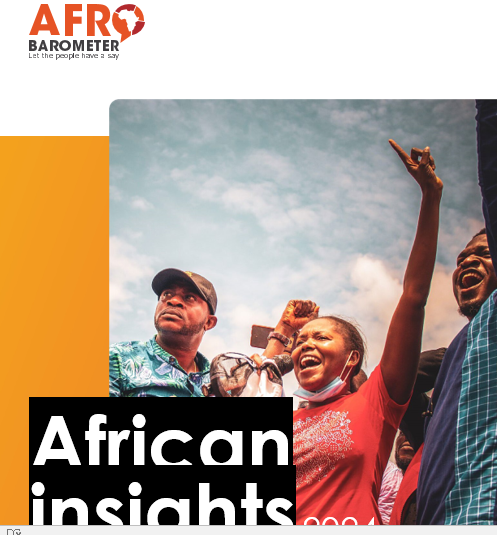But Not Economic Failures, Afrobarometer inaugural flagship report reveals
Afrobarometer’s inaugural flagship report shows that Africans remain strongly committed to democracy, its norms, and institutions, but there are also causes for concern. Over the past decade, popular support for democracy has declined sharply in several countries, and opposition to military rule has weakened. Meanwhile, satisfaction with the way democracy works has continued to decline.
While popular satisfaction with democracy is highly susceptible to economic, social, and political performance, support for democracy is resilient against economic factors such as poverty and poor economic management. Instead, the evidence points to political factors, including rising corruption in local government, poor-quality elections, and a lack of presidential accountability, as factors that tend to undermine popular faith in democracy.
Nurturing support for democracy will therefore require strengthening integrity in local government and improved official accountability.
The report, the first in what will be an annual series on high-priority topics, distils findings from data spanning more than a decade, including the latest round of nationally representative surveys in 39 African countries, representing the views of more than three-fourths of the continent’s population. The full report can be found here.
The findings, based on 53,444 face-to-face interviews, show that most Africans prefer democracy to any other system of government and reject non-democratic alternatives, including military rule. They also strongly endorse norms, institutions, and practices associated with democratic governance, such as choosing political leaders through the ballot box, constitutional limits on presidential tenure, presidential compliance with court rulings, parliamentary oversight of the executive, media freedom, and multiparty competition.
Remarkably for a continent with huge gaps in government services, a clear – and growing – majority say it is more important for a government to be accountable to the people than to “get things done.”
But other trends portend danger for the continent’s democratic development. Opposition to military rule has weakened: More than half of Africans express a willingness to tolerate military intervention “when elected leaders abuse power for their own ends,” even though two-thirds reject institutionalised military rule. While Africa’s youth differ little from their elders in their support for democracy, they express a greater willingness to tolerate military intervention.
Worryingly, perceptions of important democratic governance practices have either been declining over time, as in the case of presidential respect for the courts and Parliament, or have remained stagnant at very low levels, as in the case of equal treatment before the law.
The report also includes country democracy scorecards that present graphic illustrations of Afrobarometer findings on the most critical indicators of democratic demand and supply for each of the countries surveyed.
Afrobarometer survey
Afrobarometer is a pan-African, non-partisan survey research network that provides reliable data on African experiences and evaluations of democracy, governance, and quality of life. Nine survey rounds in up to 42 countries have been completed since 1999. Round 9 surveys (2021/2023) cover 39 countries.
Afrobarometer’s national partners conduct face-to-face interviews in the language of the respondent’s choice. National samples of 1,200-2,400 yield country-level results with margins of error of +/-2 to +/-3 percentage points at a 95% confidence level.
Key findings
Support for democracy
- On average across 39 countries, support for democracy remains robust: Two-thirds (66%) of Africans say they prefer democracy to any other system of government, and large majorities reject one-man rule (80%), one-party rule (78%), and military rule (66%) (Figure 1).
- But across 30 countries surveyed consistently over the past decade, support for democracy has declined by 7 percentage points, including by 29 points in South Africa and 23 points in Mali (Figure 2).
- Opposition to military rule has weakened by 11 points across 30 countries, most dramatically in Mali and Burkina Faso (by 40 and 37 points, respectively) (Figure3).
- More than half of Africans (53% across 39 countries) are willing to accept a military takeover if elected leaders “abuse power for their own ends.”
- Growing majorities call for government accountability and the rule of law, and support for other democratic norms has held steady over the past decade, including presidential accountability to Parliament, multiparty competition, presidential term limits, and media freedom.
o But support for elections has dropped by 8 percentage points across 30 countries, though a large majority still consider it the best method for choosing their leaders.
Supply of democracy
▪ Fewer than half (45%) of Africans in the 39 countries surveyed think their countries are mostly or completely democratic, and only 37% say they are satisfied with the way democracy works in their countries.
-
- Other indicators of democratic supply, including citizen assessments of the quality of elections (-7 points) and their president’s accountability to Parliament (-7 points) and the courts (-6 points), also show modest declines.
- Satisfaction with democracy has dropped precipitously in some of Africa’s most high-profile democracies, including Botswana (-40 points), Mauritius (-40 points), and South Africa (-35 points) (Figure 5).cross 30 countries, both indicators show declines – of 8 and 11 percentage points, respectively – over the past decade (Figure 4).
Drivers of democratic attitudes
- Support for democracy as a system of government is resilient to economic and social deficiencies (Figure 6).
o Where we see declines in support for democracy, they are most closely linked to adverse changes in political performance, such as declining election quality, increasing levels of corruption, and failure to promote the rule of law.
- Deepening citizen dissatisfaction with how democracy is performing is strongly associated with perceived declines in both socioeconomic and political performance (Figure 7).
Charts
Figure 1: Support for democracy and rejection of authoritarian rule | 39 countries | 2021/2023
Respondents were asked:
There are many ways to govern a country. Would you disapprove or approve of the following alternatives?
Only one political party is allowed to stand for election and hold office.
The army comes in to govern the country.

